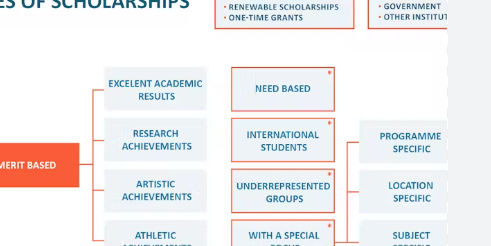Maximizing Your Scholarly Potential: Strategies for Winning Scholarships

Maximizing your scholarly potential and winning scholarships requires a combination of strategic planning, academic excellence, and effective presentation of your skills and achievements. Here are some strategies to help you succeed: Research Scholarships: Start by researching scholarships that align with your academic interests, career goals, background, and achievements. There are numerous online databases and platforms where you can find scholarship opportunities tailored to various criteria. Stay Organized: Keep track of application deadlines,
requirements, and submission materials for each scholarship you plan to apply for. Create a calendar or spreadsheet to manage deadlines and ensure you don’t miss any opportunities. Highlight Your Achievements: Develop a comprehensive resume or curriculum vitae (CV) that highlights your academic achievements, extracurricular activities, community service, leadership roles, and any relevant work experience. Tailor your resume to emphasize skills and experiences that are relevant to each scholarship application. Craft Compelling Essays: Many scholarship applications require personal essays or statements of purpose. Take the time to craft well-written, compelling essays
that demonstrate your passion, drive, and commitment to your academic and career goals. Be authentic and sincere in your writing, and ensure that your essays are free of grammatical errors and typos. Request Strong Letters of Recommendation: Choose recommenders who know you well and can speak to your academic abilities, character, and potential. Request letters of recommendation well in advance of application deadlines, and provide your recommenders with any necessary information or materials to support their letters. Demonstrate Financial Need (if applicable): If a scholarship is based on financial need, be sure to provide accurate and thorough documentation of your financial circumstances. This may include tax returns, financial aid forms, or other supporting documents. Prepare for Interviews (if applicable): Some scholarships may require an interview as part of the selection process.
Prepare for interviews by researching the organization offering the scholarship, practicing common interview questions, and articulating your goals and experiences clearly and confidently. Submit a Strong Application Packet: Review all application materials carefully before submitting them, and ensure that you have followed all instructions and provided all required documents. Pay attention to formatting and presentation, and make sure that your application packet is professional and polished. Seek Feedback: Ask trusted mentors, teachers, or peers to review your scholarship application materials and provide feedback. They may be able to offer valuable insights and
suggestions for improvement. Persist and Persevere: Winning scholarships can be competitive, and you may face rejection along the way. Don’t be discouraged by setbacks; instead, use them as opportunities to learn and grow. Continue to seek out new scholarship opportunities and refine your application materials until you achieve success. By following these strategies and staying focused on your academic and personal goals, you can maximize your scholarly potential and increase your chances of winning scholarships.Here are some additional strategies for maximizing your scholarly potential and increasing your chances of winning scholarships: Build a Strong Academic
Record: Academic excellence is often a key criterion for scholarship selection. Maintain high grades in your coursework and strive to excel in challenging classes. If your grades are not as strong as you’d like them to be, consider seeking additional support through tutoring, study groups, or academic resources offered by your school. Participate in Extracurricular Activities: Engage in extracurricular activities that demonstrate your leadership, teamwork, and commitment. This could include involvement in student organizations, sports teams, volunteer work, or part-time employment. Scholarship committees often look for well-rounded candidates who have made
meaningful contributions outside of the classroom. Pursue Research or Independent Projects: If possible, engage in research or independent projects related to your academic interests. This could involve collaborating with faculty members on research initiatives, conducting your own independent research, or participating in academic competitions or conferences. Research experience can demonstrate your intellectual curiosity, problem-solving skills, and ability to contribute to your field. Seek Out Mentorship: Identify mentors within your academic or professional network who can provide guidance, support, and advice as you pursue scholarship opportunities.
Mentors can offer valuable insights, connect you with resources and opportunities, and help you navigate the scholarship application process. Develop a Unique Personal Brand: Use social media and online platforms to showcase your achievements, interests, and aspirations. Develop a professional online presence that reflects your personal brand and highlights your academic and extracurricular accomplishments. This could include creating a LinkedIn profile, maintaining a personal website or blog, or participating in relevant online communities or forums. Attend Workshops and Information Sessions: Take advantage of workshops, information sessions, and other resources offered by your school, community organizations, or scholarship providers. These events can provide valuable guidance on scholarship application strategies, writing effective essays, preparing for interviews, and other
aspects of the application process. Network with Scholarship Providers: Take the initiative to reach out to scholarship providers, sponsors, and alumni who may be able to offer advice or support. Attend networking events, reach out via email or social media, and build relationships with individuals and organizations that have a vested interest in supporting students like you. Apply for Local and Community Scholarships: In addition to national or international scholarship opportunities, explore scholarships offered by local businesses, community organizations, and foundations. These scholarships may have less competition and may be tailored to the needs and interests of students in your area. Stay Informed About Financial Aid Options: Research alternative forms of financial aid, such as grants, fellowships, and tuition assistance programs, in addition to scholarships. Explore all available options for
funding your education and consider how different forms of financial aid can complement each other. Stay Positive and Persistent: Finally, maintain a positive attitude and persevere in your scholarship search efforts, even if you encounter setbacks or challenges along the way. Believe in your abilities, stay focused on your goals, and remain committed to pursuing opportunities that will help you achieve academic and personal success.By implementing these strategies and staying proactive in your scholarship search and application process, you can maximize your scholarly potential and increase your likelihood of winning scholarships to support your academic journey.





